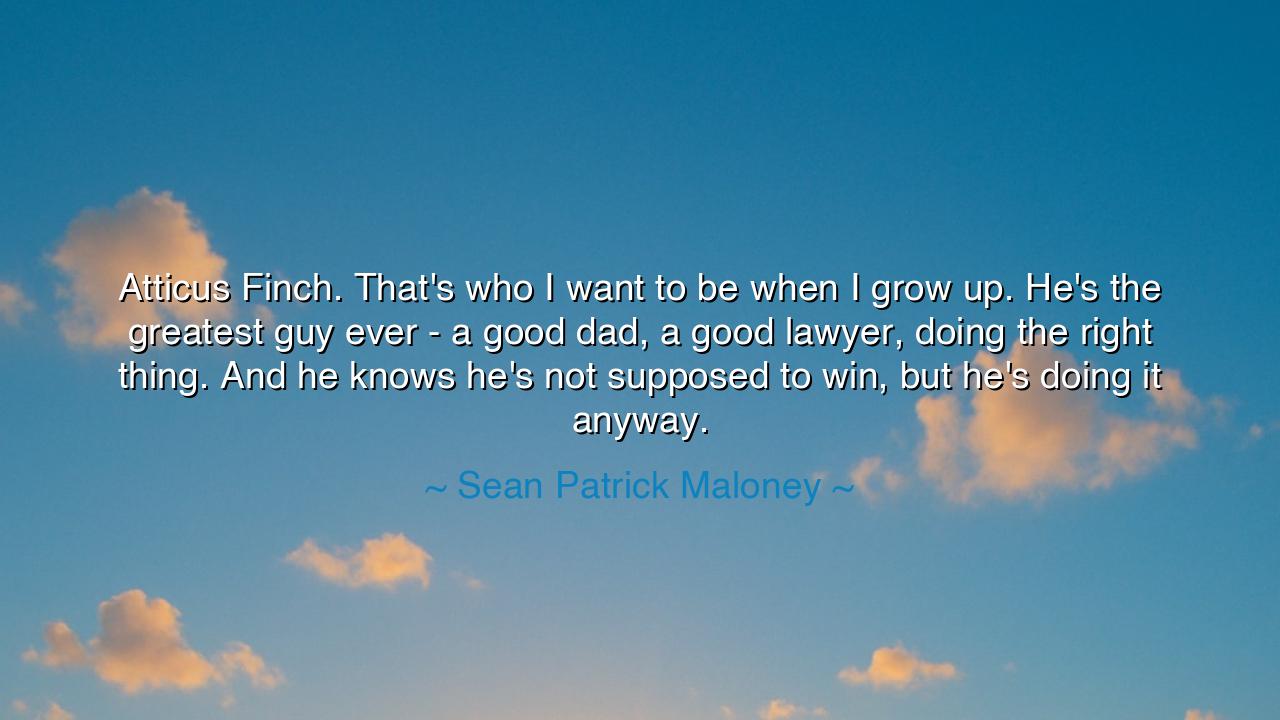
Atticus Finch. That's who I want to be when I grow up. He's the
Atticus Finch. That's who I want to be when I grow up. He's the greatest guy ever - a good dad, a good lawyer, doing the right thing. And he knows he's not supposed to win, but he's doing it anyway.






In the words of Sean Patrick Maloney, “Atticus Finch. That’s who I want to be when I grow up. He’s the greatest guy ever — a good dad, a good lawyer, doing the right thing. And he knows he’s not supposed to win, but he’s doing it anyway.” In these words lies a yearning not for fame or power, but for integrity, for the quiet nobility of one who stands for truth when the world stands against him. Maloney, a man of public service, here invokes not a historical figure, but a creation of the human spirit — Atticus Finch, the moral compass of Harper Lee’s To Kill a Mockingbird. Yet Atticus, though born from fiction, has become more real to humanity than many who have lived, for he embodies the ancient and eternal ideal of righteousness in the face of defeat.
Atticus Finch, the steadfast lawyer of the American South, defends a Black man falsely accused in a world steeped in prejudice. He knows that the verdict is already decided, that truth will not triumph in the eyes of men — yet he fights anyway, because justice demands it. In this, he becomes a symbol of the hero who acts not for victory, but for virtue. Maloney’s reverence for Atticus is not the admiration of a fan, but the homage of a soul who understands that the worth of a man is measured not by success, but by the courage to stand for what is right, even when the end is certain loss.
In ancient days, philosophers and prophets spoke of such courage as the highest form of strength. The Greeks called it areté — excellence of the soul, the pursuit of goodness for its own sake. Socrates lived it when he chose death over betrayal of his principles. The Romans revered it in Cincinnatus, who left his plow to serve his country, then returned to the fields when honor was done. And in every age, this same flame burns in the hearts of those who understand that moral courage is greater than triumph. Atticus Finch is their descendant — a modern guardian of that ageless light.
When Maloney says, “He knows he’s not supposed to win, but he’s doing it anyway,” he touches upon the essence of heroism. The true hero is not the one who conquers easily, but the one who faces certain defeat and stands firm regardless. There is no purity in fighting only battles that can be won. Real virtue is proven in the struggle that seems hopeless — for it is there that the heart’s integrity is revealed. As the warrior-king Leonidas once said before the Battle of Thermopylae, “Then we shall fight in the shade.” The shade does not dim the light of courage; it magnifies it.
Atticus Finch is not a soldier or a conqueror, yet his battlefield is no less sacred. His weapon is truth; his armor, compassion. He teaches his children not to hate, even when hate surrounds them. He shows them that dignity is not the gift of society, but the birthright of conscience. Maloney’s longing to “be” Atticus is, in truth, a longing to live with this kind of moral clarity — to be a father, a citizen, and a servant of justice who refuses to bow before cynicism or fear. His words remind us that the greatest victory is not the one won in court or in politics, but the one won within the human heart.
The lesson in this quote is both simple and profound: do the right thing, even when it costs you. Stand for truth, even when the crowd mocks you. Love mercy, even when the world offers hate. The measure of a good life is not in the trophies one collects, but in the principles one refuses to betray. Every generation faces its own injustices, its own darkness, and in each time, the world waits for its Atticus — for those who will act not because they will succeed, but because they cannot do otherwise.
So, children of the modern age, take this wisdom to heart: moral strength is the truest form of greatness. Cultivate character over comfort, integrity over influence, and compassion over conformity. The victories of such souls may not always be written in history books, but they are carved forever into the conscience of humankind.
Thus spoke Sean Patrick Maloney, echoing through the ages the call of every righteous heart: that it is better to stand alone for what is right than to triumph in what is wrong. To be Atticus Finch is to live as the ancients taught — with courage unshaken, truth unbending, and love unyielding in the face of the impossible. For such as these, defeat itself becomes a kind of immortality.






AAdministratorAdministrator
Welcome, honored guests. Please leave a comment, we will respond soon